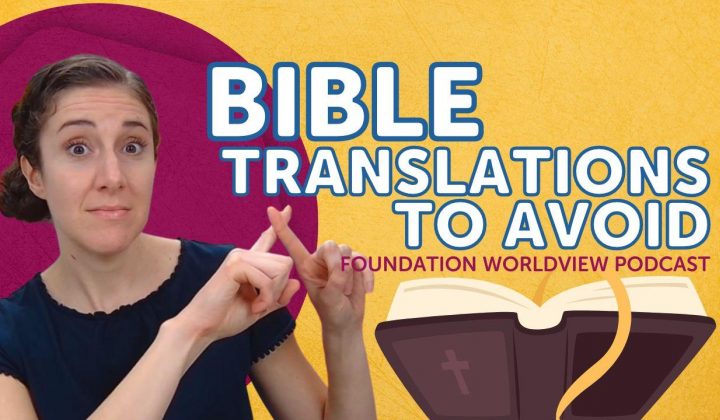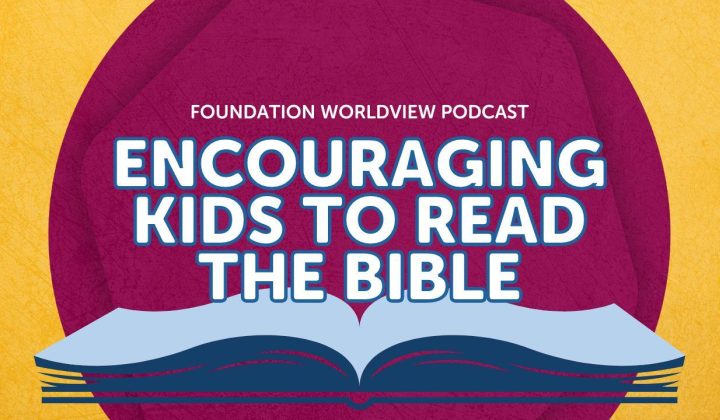Learn more about the journey that led to us equipping kids to carefully evaluate every idea they encounter.
Meet members of our team who have contributed to curriculum development.
Hear from real users of the Foundation Curriculum.
Learn what we believe about God, Jesus, Scripture, and more.
Talking to Kids About Consent
Today's question says, "How does one explain to a child about consent while making sure they know they belong not to themselves but to God?"
Transcript
Note: The following is an auto-transcript of the podcast recording.
Hello friends, and welcome to another episode of the Foundation Worldview Podcast where we seek to answer your questions so that you can equip the children that God has placed in your care to carefully evaluate every idea they encounter and understand the truth of the biblical worldview. I'm your host, Elizabeth Urbanowicz, and I'm thrilled that you've joined me for another episode today. Today's question says, "Hello." Well, hello, back to you. "How does one explain to a child about consent while making sure they know they belong not to themselves but to God?" This is an interesting question to think about, and just as a warning, because it's talking about consent, which is a very big thing in our culture, if you're listening to this podcast with little ones around, this might be an episode that you want to wait to listen to until it's just you around.
Before we dive down deep into this question, as always, if you have found the content of this podcast beneficial, would ask that you like and subscribe to make sure that you never miss a future episode, and would also ask that you would invest time in writing a review so that more people can find this content and we can equip even more adults to help the kids in their care carefully evaluate every idea that they encounter.
Now, this word consent, we know in our current cultural context in 2023 is a very hot topic. In fact, right now, consent is viewed as the only moral standard for sexual activity. So as long as there is consent, it doesn't matter what is done with whom, how it's done as long there is consent. If you are unfamiliar with this concept, and this sounds like a new thing, highly recommend that you check out the book, mama Bear Apologetics Guide to Sexuality because they have a whole section in there talking about just how in secular culture, the moral standard, the only moral standard for sexual activity is consent.
And so we need to be clear with our kids from an early age that this is a lie, that they're going to hear from culture that as long as two people agree to whatever is being done, that is fine. That act is moral. Where that from Scripture is very clearly a lie, that this is a lie they're going to be faced with in the media. It's a lie that is taught in sex ed curriculums across the country, and it is a lie that is just wreaking havoc on the next generation and on young adults and even some adults, even those who are married, the things that teens and young adults, especially females, are subjected to because of this incorrect standard of consent, it is just sickening.
And if you have no idea what I'm talking about, just Google "Live action." Live action is the organization run by Lila Rose. It's a pro-life organization. So Google Live action and then after the word live action, Google sex ed, they actually have some videos where the live action organization had some teenage girls, some young teens, girls the ages 14 or 15, go into Planned Parenthood and explain that they were in sexual relationships with their boyfriends and explaining some of the things that their boyfriends wanted to do to them and talk with the Planned Parenthood worker about that and the things that they caught on tape of the Planned Parenthood worker suggesting they will probably just make you nauseous.
But it's just important for us to know. While we shouldn't be watching those things happening through pornography or any videos that have violence like that sexually, it is important for us to know that these are the things, the advice that teens in our culture are receiving. And so while we don't have to go into this explicit detail with our children, we just want to make sure that they know that just because two people consent to a certain action does not mean that that action is moral, that God is the God of the universe, he's our creator and sustainer. He is the moral law giver. So therefore we look to His word to find out what is right, because His word, all the morals that are in His word, they are based in His character and God is a good God. And the laws that he has set up for us are for our good. They're for human flourishing. So that's the first thing. We just want to make sure that we help our kids know that just consent as the standard for sexual activity that is a lie from the pit of hell. It is not actually the truth.
Now, consent for what is being done to us in general is a good thing. Now, sometimes there are times where your child might want to do something and if they're running out in front of a car and you grab their arm, you're not going to ask for their consent to grab their arm. You're just going to grab their arm to pull them back so that they don't get run over. However, in general, consent for what is being done to us is a good thing, okay? We want our kids to know that if some, first of all, we want them to know what inappropriate touches that if anyone tries to touch them on their body in an area that is not an area where a bathing suit or that an area that is an area where a bathing suit covers, they should not be touching that part of their body. That is not good touch, that's bad touch. And if they don't want to be touched and it's okay touch, like if they don't want a hug, then it is okay for them to say, I would prefer not to give you a hug right now. So even for friendly non-sexual touch, it is important to have consent.
Now, I have seen this done in some parenting situations where parents tell their kids that they don't need to be touched in any way that they don't want to be touched. And so therefore it leads to an excuse when that child, let's say they visit their grandma or grandpa and the mom says, "okay, come on over. Give grandma a hug." They're like, "Nope, I don't want to give a hug right now." That doesn't stem from just proper protection of the body, that stems from the flesh, from the sin nature. The child wants to do what the child wants to do, and so they're using this to their advantage. So in those cases, if there's cases where you've said, "okay, you shouldn't, unless you're wanting to be touched, you shouldn't be touched," but it's appropriate for them in those situations to go give grandma or grandpa a hug goodbye. Give them some alternatives. If you're feeling like you don't want to be touched right now, you don't have to go over and give a hug, but God has commanded that we love others and we're going to love grandma right now. So you can give grandma a high five if you want. You can give a wave, you can blow her a kiss, but we have to be kind to grandma when we're leaving her house. So those are just some alternatives that if our child doesn't want to be touched, but they're using that as their selfish sin nature, we can give them some alternatives that they have to do something that is showing kindness towards that person before they leave.
Another thing that's really important for our kids to understand and for us to teach them is that no means no, and stop means stop. Even if someone says it playfully. That when someone says, no, we should stop. When someone says stop, we should stop. And so this is something that we need to directly practice and teach them at home.
So even as parents, we might be in a situation like for example, when I was growing up, my dad has always had a beard ever since I was born. And when I was growing up, my dad would come home from work. Sometimes he would grab us and in a loving, playful way and just tickle his beard against our face or against our arm or something. And jokingly we would call it the hedgehog because he had this prickly hair. And so we would laugh about it and we would play. And so I know a lot of dads play with their kids that way, and that's healthy, fun, good, appropriate play. But if we're wanting to teach our kids that no means no, and stop means stop. That means for us as adults, when our child, if we're tickling them or doing something, like I was just explaining my dad playing and scratching his beard against our face, if the child says no or stop, we need to immediately stop what we're doing so that way the child learns, oh, I can't just use these words in a playful way.
And so it's really important for our children to understand this especially, especially our boys, because very easily when they're teens, if they're just in the pool at a pool party with a friend and they're splashing a girl with water or just kind, I dunno, whatever they would be doing that's appropriate. And a girl might be like, "no, no stop" saying it in a really playful way and they're just going to continue. Well, if they're in a situation where they're alone with a girl and she says no or stop, and she's clearly saying it in a very playful or flirty way, but he doesn't stop, that's something that legal action could actually be taken against him one day. So it's very, very important for our children to know, for their own safety that whenever someone says no or stop, we immediately stop. And this is something that we as parents have to model.
Now, once our kids know this and they know that when they say no or they say stop, and someone doesn't do that, we need to prepare them for, okay, what do we need to do? Then you should immediately, if it's with another child, you should immediately stop playing and talk with that person. If it's an adult, okay, you say no and you go away from them, then the next step is to come and to talk to you or to the nearest safe adult that they understand that when they say no or they say stop, others should listen to that.
And again, we want to ground this in Scripture, and that's why I like the way the person who wrote in this question phrased it. How do we talk about consent while making sure they know they belong not to themselves but to God? And so this is something that we can actually ground in Scripture. And again, those of you who listen to this podcast often are probably tired of hearing me reference the first chapter of Genesis. But that first chapter of Genesis is the first chapter of Genesis for a reason. It's foundational. It teaches us so many truths about who God is and who we are.
In verses 26 through 28, talk about humans being God's image bearers. And so talking about what is our responsibility on this? Our responsibility is to reflect God to others. God has made us as His image bearers. And then we can even go into 1 Corinthians which talks about us not being our own. In 1 Corinthians chapter six, now this is specifically talking in the context of sexual activity, but Paul says, our body is the temple of the Holy Spirit. We are not our own. We have been bought with a price. Therefore, we are to honor God with our bodies. And we want to take our kids to these passages of Scripture so that they understand, okay, it's not just about no and stop. It's about actually respecting that person as another image bearer. That that person, body and soul is a creation of God who bears his image.
So when that person says no, or stop, we are to respect them by stopping. And it's the same with us that God has made us valuable. We are valuable, our bodies are valuable. And so when we say nor stop, someone needs to stop. And we want to make sure that we're grounding that in the truth, that we're image bearers of the Holy God. And then as Christians, we have been bought with a price, and our body actually is the temple of the Holy Spirit because oddly enough, our overly sexualized secular culture, it talks about consent being this moral standard, but it has no grounding for it.
Why is it that there should need to be consent in the secular worldview? There is no objective moral grounding for that. However, in the biblical Worldview, valuing our bodies and treating them with dignity and respect is grounded in the objective truth that we bear the image of the Holy God. And then for Christians that we are the temple of the Holy Spirit.
Well, that's a wrap for this episode. But as always, as we leave this time together, my prayer for you is that no matter the situation in which you and the children God has placed in your care, find yourselves you would remember, and trust that God is working all things together for your good by using all things to conform you more into the image of His Son. I'll see you next time.
Related Posts and insights

Bible Translations to Avoid
What Bible translations should we avoid? In this episode, Elizabeth Urbanowicz looks at translations that we may want to consider avoiding, especially when reading with our children. Listen as she shares tips and insights into translations and why certain translations should be avoided.

How to Study the Bible for Kids and Parents - A Starter’s Guide for Home Discipleship
We need to teach our kids how to fish so they can read, interpret and apply the Bible for themselves.

Encouraging Kids to Read the Bible
In this episode of the Foundation Worldview Podcast, Elizabeth Urbanowicz explores strategies to help children read the Bible independently, using a structured "I do, We do, You do" approach. She shares insights, resources, and personal stories to inspire a lifelong love for Scripture.





